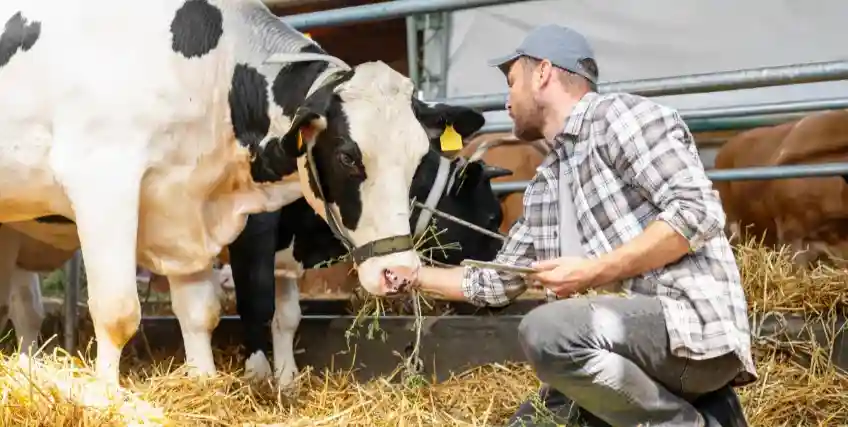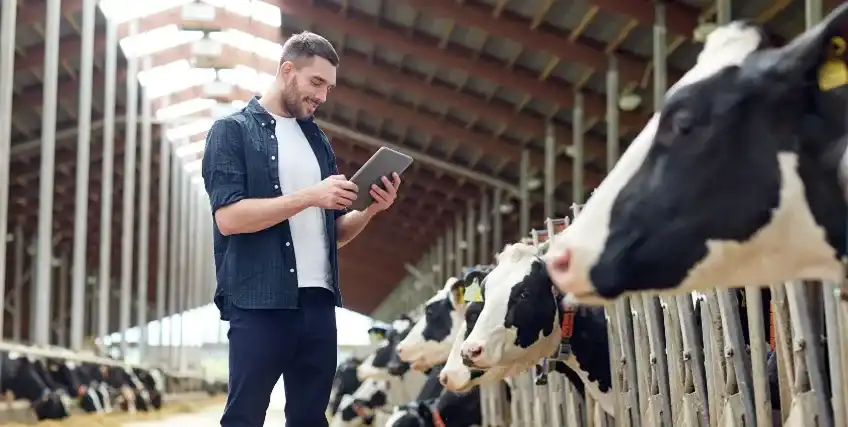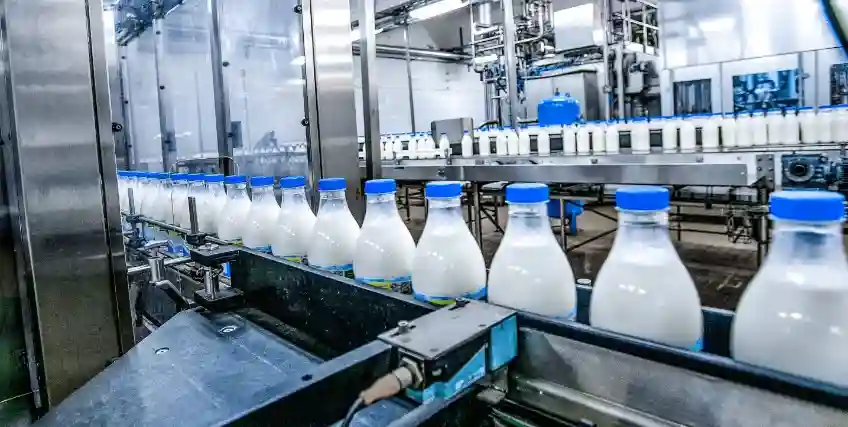How Dairy Farmers Can Secure Financing for Equipment, Livestock, and Land
Oct 14, 2025 | Last Updated on: Oct 15, 2025

The modern dairy farm is a complex business, rife with challenges in an ever-changing world. Today's farming industry requires significant upfront capital investment to keep up with the costs of running a high-tech, modern operation. Understanding the dairy farmers loan options on the market—from traditional banks to specialized government and cooperative programs—is crucial to ensuring your operation has the capital required for growth. From high-end equipment like automated milking parlors and feed systems to land requirements to support fertile pastures and cattle, you need to constantly put in a sustained investment to achieve profitability.
Here, we dive into the financing landscape so you can figure out how to support your major capital needs.
In this article:
- Understanding the types of lenders available for dairy farmers loans.
- Diving into the types of loans available to support everything from new dairy farm equipment and dairy operations to farmland loans for dairy farmers.
- Exploring how to improve your credit approval chances for farm loans.
Traditional and Specialized Dairy Farmers Loan Options
Most small business owners start with traditional financial institutions when looking for business financing. Dairy businesses and farming operations can do so, too, but you may find that more specialized loan programs are better options.
Traditional Banks and Credit Unions
Traditional lenders like banks and credit unions often offer standard small business loans and real estate loans to farmers. They can be good options for well-established farms with strong financial histories, substantial collateral, and owners with good credit. Traditional banks and credit unions tend to offer competitive interest rates, but usually at the cost of strict eligibility requirements.
Farm Credit System (FCS)
The Farm Credit System (FCS) is a nationwide network of borrower-owned lending cooperatives dedicated exclusively to agriculture and rural America. Dairy farmers loan applications receive specialized attention here, as these lenders understand the unique cycles and challenges of the dairy industry.
The FCS offers a full range of products, including real estate loans that typically have longer and more flexible terms than commercial bank loans, business lines of credit, equipment financing, and more loan programs. A unique benefit of the FCS is the patronage program, where a portion of the lender's net earnings may be returned to borrowers, which may lower the overall cost of the loan.
Alternative Lenders
The business lending landscape is evolved significantly in the last few decades. Today, there are many online and alternative lenders that offer more flexible and accessible financing and refinancing. These lenders often specialize in fast funding times and lower eligibility requirements, making them appealing for a wider range of applicants.
Alternative lenders often have lower loan amounts, higher interest rates, and shorter repayment times than traditional loans, but they can nonetheless be an excellent resource for dairy farmers loans. From working capital to real estate needs, alternative lenders can offer a variety of loan products, especially to dairy farmers who may not qualify for funding from traditional financial institutions.
USDA-Backed Farm Service Agency (FSA) Loans
The U.S. Department of Agriculture's Farm Service Agency (FSA) is an outstanding resource for dairy farmers loans, especially for beginning farmers who may not qualify for conventional bank financing. The FSA offers two main paths: Direct Loans and Guaranteed Loans.
Direct loans
Direct loans are those funded and serviced by the FSA directly. These loans offer favorable terms and lower interest rates for qualified applicants. They include:
- Direct Farm Operating Loans (OL): These versatile funds have a maximum loan amount of $400,000 and can be used for essential needs like purchasing livestock, feed, farm equipment, and covering annual operating expenses. Repayment terms for equipment and livestock often do not exceed seven years.
- Direct Farm Ownership Loans (FO): These funds are used to purchase or expand a farm, construct or improve buildings, and implement conservation measures. Repayment terms can extend up to 40 years, and the maximum loan amount is $600,000.
- Microloans: A simplified version of both OL and FO loans, FSA microloans are designed for small and beginning farmers. They have less paperwork, more flexible eligibility requirements, and a maximum amount of $50,000.
Guaranteed Loans
The FSA also works with traditional lenders by guaranteeing up to 95% of the principal loan amount. This reduces the risk for commercial lenders and encourages them to extend credit to farmers who might otherwise be declined. The maximum loan amount for Guaranteed Farm Ownership Loans may be significantly higher than Direct Loans since they adhere to the lender's standards rather than a government program's guidelines. That makes them more suitable for large-scale dairy farmers loans.
Grants
In addition to USDA loan programs, the USDA's Rural Development arm also provides grants or cost-share payments for specific improvements, such as conservation practices, energy efficiency upgrades, or value-added processing projects.
Grants are not loans. They don't require repayment. However, they can be exceedingly difficult to win, as they're competitive and you'll need an outstanding pitch to show how you'll use the grant to meet the purpose the grant aims to achieve.
Specific Financing Options
The type of dairy farmers loan you pursue should align with your goals and needs. In some cases, you may find hyper-specialized loan programs.
Equipment Financing
One of the biggest expenses any dairy farmer has is in equipment. Rotary parlors, robotic milkers, tractors — the list goes on and on. Farms have significant equipment needs and equipment loans can be an outstanding way to manage those costs.
With equipment financing, the equipment itself serves as the primary collateral, making it easier to secure. It may require only a small down payment and allows you to purchase the equipment through monthly payments rather than a complete upfront investment. Financing equipment can be a great dairy farmers loan because you can use the equipment to generate revenue while you're still paying it off.
Livestock Financing
Financing a herd—whether for initial purchase or expansion—requires specialized dairy farmers loan products. FSA Direct Farm Operating Loans can be a good resource for doing this, but you can also explore specialized lending options from online lenders. These dairy farmers loans often use the livestock and feed as collateral for the loan.
Livestock financing is inherently risky given market volatility and the health risks associated with herd animals. To qualify, you'll need a strong business plan that details herd health protocols and milk price projections to show you've thought through your application.
Co-op Funding
Many dairy farmers are members of dairy cooperatives. These co-ops may offer specific financing programs or allow farmers to access capital based on their equity within the cooperative, serving as a specialized form of dairy farmers loan.
Tips to Qualify for a Dairy Farmers Loan
Every lender has different qualification standards. Most require a minimum credit score and financial documentation, but flexibility may vary depending on your business plan and experience. Follow these best practices for a successful dairy farmers loan application:
- Check your credit: Lenders will always review both your personal and business credit scores (if applicable). A stronger credit history will give you a better chance of approval and securing lower interest rates. Check your credit report before applying to make sure there aren't any errors and take the time to pay down some debt first, if necessary.
- Show your experience: FSA loans, in particular, often require a minimum of three years of experience operating or managing a farm for Direct Farm Operating Loans, though exceptions exist for beginning farmers. Private lenders will also want to see your experience so they know they're getting into business with someone who knows what they're doing.
- Provide detailed documentation: Before applying for a dairy farmers loan, it's important to get organized so you can show a detailed summary of the farm's assets, liabilities, tax returns, and financial statements. It's also a good idea to provide a detailed, month-by-month projection showing expected milk sales revenue, feed costs, labor, and other expenses. It all paints a picture of a thoughtful, fiscally responsible applicant.
- Create a detailed business plan: A well-written business plan should articulate the farm's mission, show a market analysis and operations plan, and have a clear exit strategy for the loan. Lenders should be able to see how you plan to repay the dairy farmers loan.
Final Thoughts
In a volatile industry, dairy farmers often have to depend on outside capital to keep their businesses running smoothly. By understanding your financing options and preparing thoroughly, you may be able to ecure the capital needed to keep your dairy business running smoothly. Use this guide to compare traditional banks, Farm Credit lenders, and USDA-backed programs that support long-term growth.
FAQs About Dairy Farmers Loans
1. What is a USDA Guaranteed Loan?
A USDA Guaranteed Loan is issued by a commercial lender, such as a bank or Farm Credit institution, but backed by the FSA. As such, it may serve as a good option for a dairy farmers loan.
2. Can I use an FSA Operating Loan to purchase a whole herd of dairy cattle?
Direct Farm Operating Loans can be used to purchase livestock, feed, or other annual operating expenses for a dairy farm.
3. What is the main benefit of financing through the Farm Credit System (FCS) versus a commercial bank?
The primary benefits include specialized agricultural expertise and the patronage program. FCS lenders are owned by their borrowers and have a deeper understanding of the unique financial cycles of dairy farming than most commercial banks. The patronage program can also return a portion of interest paid to the farmer, effectively lowering the loan's cost.
4 How important is my Debt Service Coverage Ratio (DSCR) when applying for a land loan?
Lenders use your DSCR to determine your ability to repay the loan, so it's very important. A good DSCR demonstrates that your farm's cash flow is higher than its total annual debt payments, which will make it more likely you're approved for a land loan.
5. Is equipment leasing a better option than an equipment loan for milking robots?
It depends on your goals. An equipment loan gives you ownership of the asset and is preferable if you plan to keep the equipment for a long term. Leasing is often preferable for high-tech, expensive items like milking robots due to lower upfront costs.
Frequent searches leading to this page
Term Loans are made by Itria Ventures LLC or Cross River Bank, Member FDIC. This is not a deposit product. California residents: Itria Ventures LLC is licensed by the Department of Financial Protection and Innovation. Loans are made or arranged pursuant to California Financing Law License # 60DBO-35839




